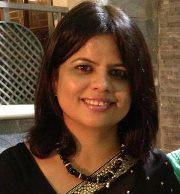Sounding out a heavy metal project, in concert with India
Published on 25 May, 2012
CQUniversity could be collaborating with a leading Indian university to get rid of heavy metals from Indian and Australian soil using hyper accumulator plants.
If the project gets funding, it will be thanks to groundwork by CQUniversity alumnus Dr Poonam Bhatia,who completed her PhD in 2003 under the supervision of Associate Professor Nanjappa Ashwath and Professor David Midmore*.

Dr Poonam Bhatia
Dr Bhatia is currently working for the Department of Education Employment and Workplace Relations (as a Research and Evaluation specialist at the Education Evidence Section of the National Schools and Youth Partnership Group).
Her major role is to conduct research on education related issues, analyse data and provide policy advice.
"Recently, I got an opportunity to write a research project and establish collaboration between CQUni and Banaras Hindu University in India," Dr Bhatia said.
"It is a phytoremediation project. Australian soil is naturally contaminated with heavy metal but the Indian soil has got both natural and artificial heavy metal contamination.
"Both the countries have native plants that accumulate heavy metal. It is proposed that effectiveness of Australian native plants in cleaning Indian soil would be studied and vice versa.
Once the project gets funding, experiments will be conducted in both the countries and the results will be made publicly available."
Assoc Prof Ashwath says that, once funding is secured, this venture should allow postgraduate students from Australia to spend time in India (and vice versa) working on a common research topic of benefit to both countries. He said the proposed plan could also create an opportunity to offer joint degrees.
* After finishing her PhD, Dr Bhatia got a prestigious Japanese Society for Promotion of Science post-doctoral scholarship and went to the University of Tokyo to conduct research. She later worked for CQUniversity for a few months but has not been linked to the institution for several years.

